Karen Williams Interview
Author notes: - The following interview took place in April and May of 2020 and it was a total pleasure to talk with Karen.
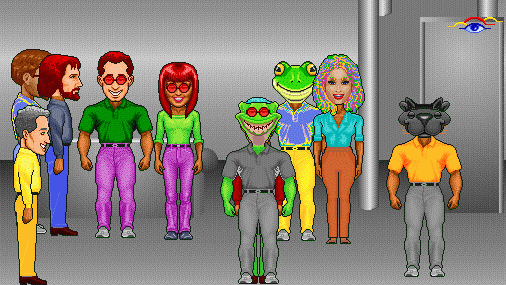
How did you get hired to work on WorldsAway and what was your role on the team?
I managed the software development team during the time we moved WorldsAway from Compuserve to the internet. Did you know that Reid Hoffman was the product manager for that project?
Author notes: - Reid Hoffman later became the co-founder and executive chairman of LinkedIn, alongside former WorldsAway staffer Jean-Luc Vaillant.
Ron Lichty promoted me to development lead (not manager) before he left, so I don't know who officially made me the manager. I know at some point I "reported" to Reid, but I had very little interaction with him.
I knew Reid and Jean-Luc founded LinkedIn, because once Reid left PayPal he grabbed a bunch of my team, including Jean-Luc, Chris Ebert, and David.
The last two are personal friends of mine. In fact, I got hired initially because I was friends with the entire IT group, who recommended me for the job. Then when it became apparent that we needed more engineers who knew something about game development I reached out to my game development friends and brought in Chris and Sheryl Knowles, who did art for video games and was put in charge of the art department.
Anyway, Reid started a series of startups, using the same people. David and I both study aikido, so I would pick him up from the current startup after I got done wherever I worked, come in and say hi to Reid and Jean-Luc (Chris stopped working with them after the first couple of startups didn't get off the ground), and we would go to aikido class.
Jean-Luc worked for me at Fujitsu (I brought him over from France), and he was terrible about testing. When they were going to go live, I insisted that they do a real end-to-end test first, so they hired me to write one. Jean-Luc found and fixed a couple of small bugs, and the rest is history. (My LinkedIn system number is 1000.)
How did you come to know all of those people that later became an integral part of the team?
I knew all those people because we were all in the Society for Creative Anachronism together. Chris Ebert and I were squired to the same knight, and Sheryl was in our SCA household (plus I also am a calligrapher, and she has done the artwork on scrolls I've done the calligraphy for). The IT department was all in the SCA, too, which is how I got the job.
I hardly ever see Chris, because he got married and moved farther up the Bay, but we exchange the occasional email. I see David all the time. We still belong to the same aikido dojo, and he trained me for my second degree black belt test.
I know some people are still upset about how things went down. Moving WorldsAway to the internet was Jeff Crilly's idea, and he worked out in a general way how to do it, but he never talked directly to me about it. Then I was made the manager of the team, and he was furious (but again wouldn't talk to me about it). I would have been happy to have him lead the technical side of things, if he had, well, talked to me about it. But he left the company not too long after that.
I just went to your site and read the interview with Vaz. He and Scott did an amazing job of creating and managing the Dreamscape. For a while I did some of the programming to create in-world objects, and I used to piss him off (and rightly so) because I would go in-world to test things.
Do you remember what the social scene was like at FSC? I know you were already friends with some of the people there, but was there a social atmosphere in general where people would stay late after work and game, or meet up for dinner/movies/etc outside of work?
The building we worked in was fairly isolated from restaurants, so usually we all ate in the company cafeteria. There were a couple of very nice Korean women who made us lunch. Sometimes they tried to make special requests that were...just...not...right, but were still tasty.
It was a pretty large group, with development (mine), QA (which was run at first by someone whose name I've completely forgotten, but was taken over by Lambert Ma, who moved over from development. He did a good job.), art (Sheryl), business (Reid, Brian [another SCA friend I brought in], others).
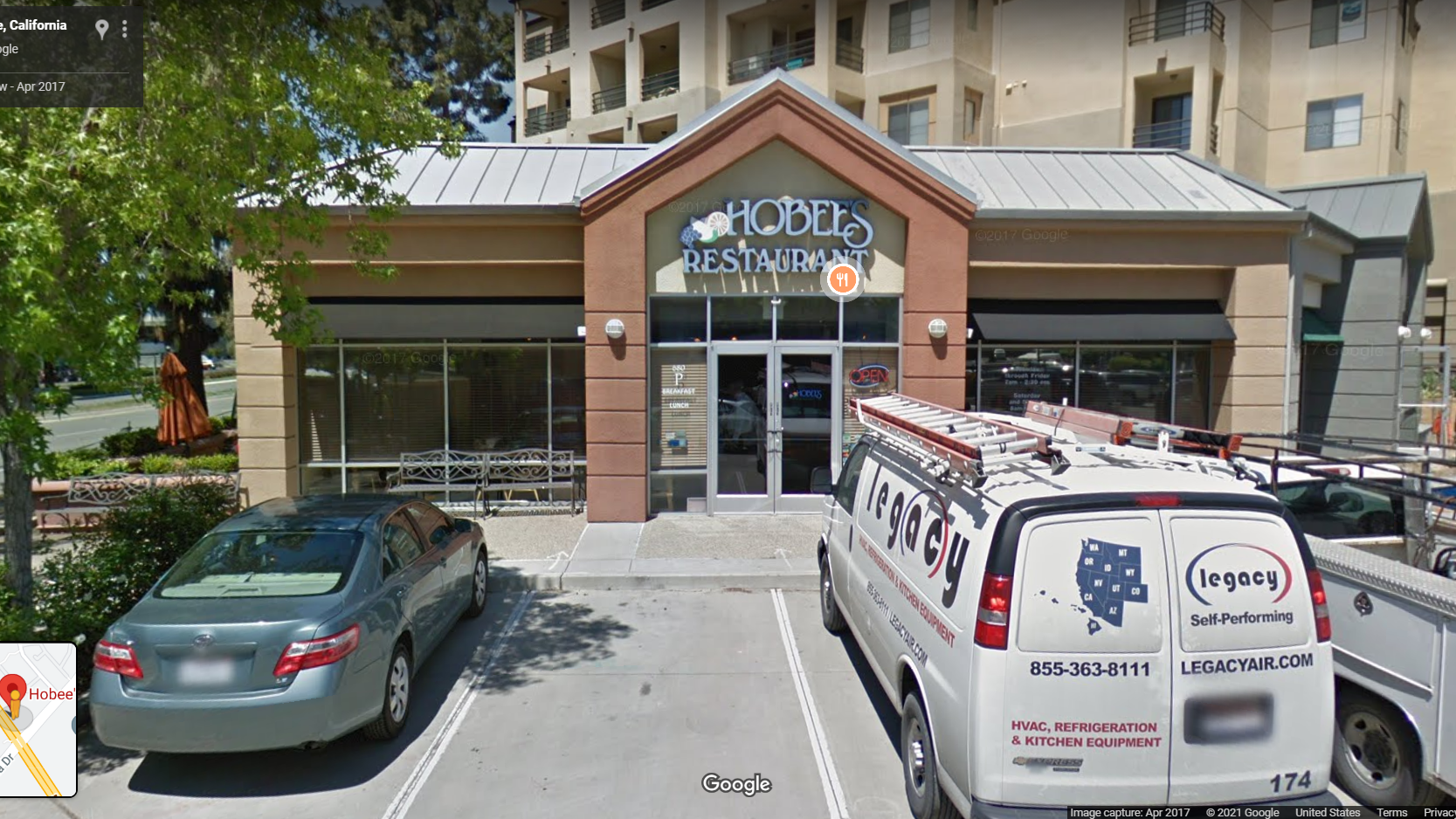
I saw my SCA friends on the weekend, and sometimes a few of us would go out to eat at the local Hobee's coffee shop (it's a local South Bay chain). There were so many people doing so many things, and I didn't keep track of them.
When did you start at OSSI? (Fujitsu Open Source Solutions, Inc, precursor to Fujitsu Software Corporation)
I started in June 1994 as a software developer, and became manager in May 1996. Chip Morningstar and Randy Farmer were both still there when I started, though unfortunately Randy left not too long afterwards.
I left in January 1998. Fujitsu has a habit of blaming the mistakes of the business people on lower level managers.
When I took over, I worked with the team on a schedule, and we worked out that to transfer what existed on Compuserve to the web would take one year. (It was a straight waterfall project, and was being programmed by most of the original team, so they knew what they were doing.
I brought Jean-Luc over from France on John Onusko’s (aka Surfdog) recommendation, so he had someone else to work with, and I hired someone to replace Jeff Crilly, plus at least one other new hire).
It took us one year and a couple of weeks (with constant pressure from Japan to do it faster), and in that year the sales people managed to sell only one other virtual world, so Japan was mad. I found a printout in the printer tray of an email sent by the Fujitsu lawyer to the Japanese management, where he was saying it wasn't fair to blame all their problems on me because I'd done a very good job. (I wish I'd kept it.)
What they did was bring in a new person to be the manager, and gave him what they claimed was a partially done performance review of me supposedly written by Reid, who had left the company. (I’m certain he didn’t write it, since at the time he told me he wasn’t going to..) This "review" said I had done a terrible job. I wrote out my version of events, and warned the new manager about the blame game.
I did what I was supposed to do, which was find a new job, and the manager who replaced me emailed me a few months later. He complimented me on what a good job I had done in building the team, but he had heeded my advice and found another job. (Note that I did a good job for a first-time manager in that situation, but I know I made mistakes. I'm certainly not perfect, and I was lucky to have such a great team).
That's not surprising to hear about Fujitsu. It does sound like they had unrealistic expectations of things and just wanted an immediate return on their investment.
Scott Moore once said that one of the Japanese execs had mentioned something along the lines of "Why should I be paying for Oracles in the US when I have housewives in Japan doing it for me for free". It kind of makes you realise where their heads were at.
When I became the manager, Chris Ebert asked me what I did now, since I obviously wasn't programming anymore. I explained that my job now was scheduling meetings, accepting meeting requests, preparing for meetings, attending meetings, and writing up the results of meetings.
Mostly the discussions about features went like this: the Japanese asked Tony Christopher or Reid for a feature, I was told my team needed to write the code for it, I talked to my team about what needed to be built, they told me how long it would take, I told Katsuhide Hirai who was in charge of the WA team in the USA, and I was told that would take too long. (Everything would always take too long. Even though the features appeared when I said they would.)
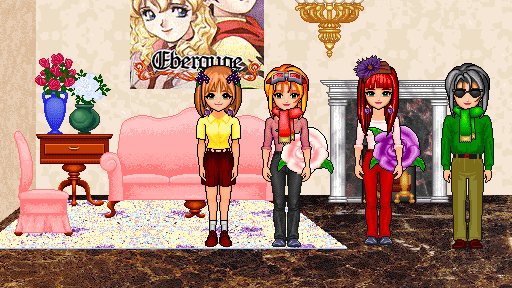
I remember one major feature that was a problem for Japan was the ability for the avatars to sit. For some reason my team had problems with getting this to work, and a team from Japan came over to check up on us. They would always speak to us in English, then turn their backs and have rapid conversations in Japanese. One time they came to see why sitting wasn't working, then went into one of their discussions. They claimed they weren't talking about sitting, but every other word was "suwaru", which means "sit". I knew this because in aikido every technique is done standing or sitting, and the sitting techniques are called "suwaru waza".
You mentioned you dealt with the Japanese team. Could you share another example of how you would have interacted with them?
One time I went to Japan for a week, to talk to the Habitat II team but also to talk to other teams as well. Reid Hoffman was supposed to go with me, but he called me a couple of hours before I was leaving for the airport to tell me his passport had expired, so I ended up going alone. It was a great trip from some perspectives, but he was the product manager so some things I couldn't answer. (Ironically, I'm a product manager now.) Also, I was a female engineering manager, which was unheard of in Japanese culture, so some of the people I met with didn't know how to deal with me. I was 5'9", so I was taller than most of them, too. I had a great time, but I don't know that without Reid it was useful from their standpoint.
Japanese business culture is weird. When I went to Japan, the director who had sponsored our trip, and who was in charge of Habitat II, took me over to meet *his* boss. By that I mean, we were in a Fujitsu building in Nagasaki, and the entire floor was open. Engineers sat at desks lined up touching each other side by side and back to back, with scarcely any room to move between the rows of people. At the end of each line of desks was the manager, and over in the corner the director. I wish I could remember his name (he was very nice), but when he took me over to meet the director I went into the standard Japanese business greeting sequence (in Japanese - in the US the wives of the Japanese engineers taught us the language so they could have something to do), starting with "Hajime mashite" (pleased to meet you). It's a ritual, so we went through that, then the two of them continued speaking in Japanese. I understood the director's boss asking how long I'd be there and the director saying a week (simply because I'd learned those specific words), and I thought it was rude of him to speak Japanese in front of me because I wasn’t fluent. Afterwards my director was really excited, because he'd won some points in their game, because his boss thought I was fluent in Japanese.
I love the fact that you went over there though and they were so culture shocked by the fact you were a woman in a high level position who knew her stuff. There were all these smart women in prominent areas of the company, making decisions and contributing in a major way overseas, but not yet in Japan.
Right when I was promoted, another woman manager at Fujitsu had been given a bad review and was being let go. She talked to me about it, and I couldn't help her because at that point I had only been given good reviews. However, I told my team that I was going to be given a bad review and have everything blamed on me when the project ended. Yup.
What was interesting is that we did our first big release, and I had been bad-mouthed for a year from Japan. But instead of firing me, my team and I just kept going. We (mostly John Onusko and a couple of the other engineers) invented agile programming. We planned releases based on what we would be ready for release at regular intervals, and we had always had a daily meeting to go over (very quickly) the current list of what we were doing and check to see if there were any problems.
We'd had that meeting when Ron Lichty was director. It was supposed to start at 1:00, but I was the only person who would show up at 1:00. People would come in, but down their stuff, and say they'd "be right back", or just wander in late. (Morale wasn’t very good because of the negative response once we’d completed the internet version, and because Jeff had left unhappy.) We never started until about 20 minutes past the hour. When I was in charge, the same thing happened, so I told the team that if they were late they owed me a dollar. And the next day, most of them were on time, but the couple of people who were late had to give me a dollar. We eventually defined "on time" as being in the room by 1:05 p.m. as defined by the clock in the room. For my part, I ran the meeting quickly, had people tell me how they were doing and if they needed anything from anyone, then stopped when we were done. The meetings never went the full hour, and people showed up on time, ready to contribute. (I used the money to buy snacks for the team.)
Randy Farmer recently dug up an old white paper that the Fujitsu Habitat team published in 1990. There's a couple of photos of two of the team members who I'm pretty sure went on to become part of the Habitat II team. Do you recognise either of them?
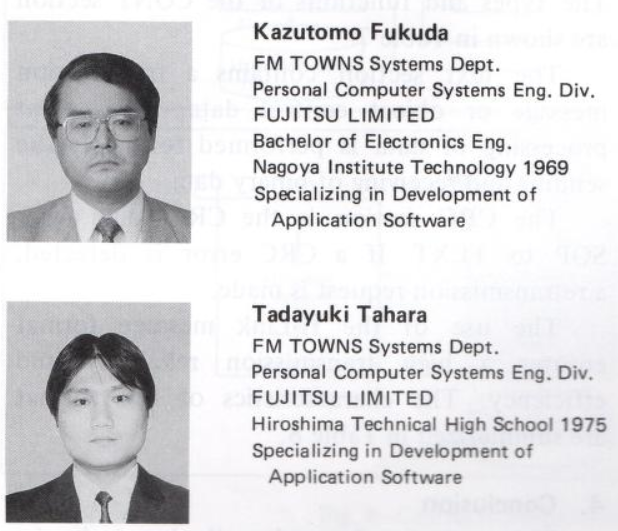
Ah, Fukuda-san. Yes, I worked with him. He was my sponsor in Japan, and the one who was so excited his boss thought I was fluent in Japanese. He was good to work with. I liked him. He didn't usually look that grim.
Do you recall who was in charge of projects when you started at OSSI?
When I started at Fujitsu, Mike Torgerson was the director in charge of the various projects there. He did a good job (I heard no complaints) and I liked him, but one day he disappeared and was replaced, over the next couple of years, by three men, two of whom were named Mike (and all three of them white, of course). I know Hirai-san had been telling them I was doing a bad job, because one of them (the one who stayed there only a few months) said something really rude to me at our meeting to introduce ourselves. That was probably our only meeting. He'd extended beyond the Peter Principle.
Do you recall who was in charge before Mr Hirai?
The person before Hirai-san was nice and kind of easy-going. I didn't interact directly with him because I was too low-level while he was in charge. Hirai-san started about the time I became manager.
Do you remember if the previous person was called Yoshi Matsumoto? Randy Farmer once told me that he was instrumental in bringing Habitat to the west on Fujitsu's dime.
Yes, Yoshi Matsumoto was our VP before Hirai. I didn't have anything to do with him. Mostly I dealt with them through the lawyer, whose name I don't remember. Tom Duffy?
It sounds like things were pretty easy going for a time. It’s been said to me that at some point, Mr Hirai had a meeting with the entire department and from that moment on things changed in a negative way.
Yes, when Hirai-san took over things became tenser.
Did you ever deal with Mr Hirai directly in your role as manager?
Reid or Tony would have dealt with that. Also, I forgot about Brian Price. He's another old friend of mine that I brought in. I'm not sure what his title was, but he dealt with business aspects. After I left he handled a lot of the organization and coordination between groups.
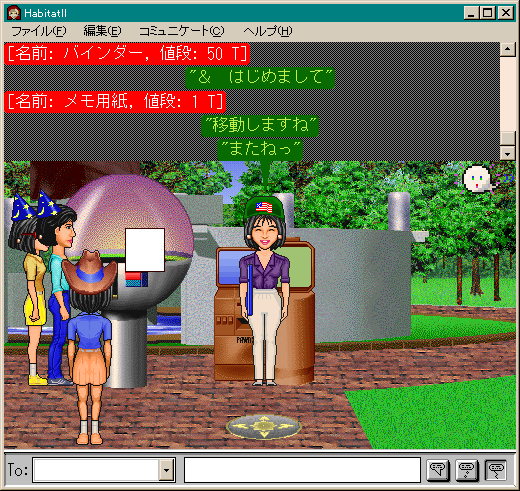
Do you remember how the Japanese team obtained the latest builds from you guys and did they have an appointed person from the team to take point in asking questions about them?
One of my jobs as a programmer was setting up the release process. We had C++ code on Unix, Apple, and Windows platforms, plus art. It unfortunately involved some manual steps, but it worked (at the time). I'm pretty sure that David took it over and vastly improved it.
You mentioned to me previously that the last programming you did was Tcl. I saw somewhere early on that you were an object coder originally. Did you get to return to your roots on the project before you left in that case?
I have an MS in computer science from Univ of Wisconsin-Madison, and had been a programmer for five years before joining Fujitsu (mostly writing a SQL database server at Amdahl).
After Fujitsu I became a professional services engineer for a database startup, where I wrote the code to integrate our solution into customer software (mostly phone companies and dot coms). I was hired at Fujitsu to help with the database they were building, but as I recall Jeff Crilly or John Onusko came up with a different way to do it, so I transitioned to doing other things.
Do you remember any specific features or ideas that you had which you implemented into WorldsAway? It could be a feature, or an idea for a piece of art, an idea for a region, naming something... things like that.
Brian Price is the father of two of my godchildren. His daughter is very cute, and when she was a baby her mother (my good friend Anne, who was a bridesmaid at my wedding) made angel wings that fit her. Anne took a picture of her, and that picture became an item inside WorldsAway. I think it was limited, but it was adorable.
It's been mentioned that if anyone copied Tom Duffy in an email or conversation that it was seen as a bad thing (like a reprimand). Do you remember this being the case at all?
I think Tom Duffy was the go-between for the Japanese with the rest of the company, but I don't know how he interacted with everyone else. He's a lawyer, but I don't know what kind.
In that printout I told you about, he did say I was doing a good job, which was nice of him. I didn't have much to do with him directly.
I remember one time, when I had to give performance reviews (which affected raises, etc.), I was supposed to grade everyone on a 1-5 scale or something like that (standard stuff). He came by and explained that I wasn't supposed to give so many 4's and 5's, because it meant that people would get too much of a raise. I explained that my team was doing an incredibly good job on something that was very new, and I gave the team the high numbers. He came back and said, "But I told you you shouldn't do that" and I said, "You suggested, but my team deserved what I gave them." And my review numbers were accepted.
Another notable interaction I had with Tom was at a company carnival Fujitsu put on for us. It was probably for the whole company, not just us. Anyway, there was a dunking booth, where employees got three tries to throw a softball through a target, and if you did, the person in the booth got dropped into a tub of water. Tom was in the booth, and I went up. I got my ball, threw it badly twice, then pointed out to myself that I'd been a girl and girls were taught softball, so I threw underhand and dunked him. He told me later I'd caught him by surprise and he'd almost lost his glasses.
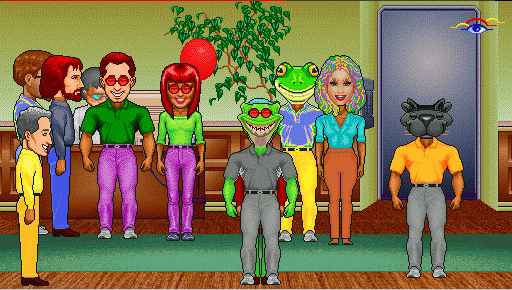
Can you recall anything about the “Hallway” world? Later known as “Hotel Silicon”.
We had a smaller world spun up called "Hotel Silicon", which was free. Anyone could join, so long as they had an email account. Well, this was about the time that Hotmail started, and they gave free email accounts, so lots of kids started hanging out in Hotel Silicon. I was technically the manager of the world, though it didn't have any good backstory or a real Oracle. It was just a demo world.
Some of the teenagers figured out how to hack the code that controlled in-world objects. It wasn't very secure. Two of the most obnoxious of these kids would brag about all the hacking they were doing, and there was one thing in particular (that I don't remember) that I noticed. I think I may have seen something in the paper about it. Anyway, I called the FBI and told them about these kids. In a day or two they had disappeared from Hotel Silicon, and a few weeks later I read another article in the paper about the FBI arresting hacker children, and gave them the user names of these boys as who they had arrested. I have no patience with thieves.
I remember hearing about that! I don't know if this is one of the names, but I remember Tigereye was a prolific patcher at the time and there was also someone called Biteme.

BiteMe was one of the hackers, but I don't think TigerEye was the other one. The other one had a childish name, too. The newspaper account I read didn't list BiteMe by name, but I knew it was him because they wouldn't print something vaguely obscene like "BiteMe".
Around August/September of 1997 it was mentioned you were showing an interest in managing the Hallway world. Do you remember your thought process for wanting to take that on?
When the apartments (I forget what we called them) were created, the users decorated them by sticking objects on the walls. I was really surprised by this, because nobody had said anything about users wanting to do that, so we hadn't put in an easy way to decorate, or thought about the performance implications of having that many objects in one place.
I wanted to be involved in Hotel Silicon because it wasn't being managed. I don't remember if Vaz had left yet (I think he had), but even if he hadn't Dreamscape would have kept him busy. I wanted to get an idea of what users were interested in, by actually being in a smaller world, and I didn't want to step on Vaz's toes (yet again). Unfortunately, like I said, it became invaded by kids with free Hotmail accounts.
The apartments were called turfs. Vaz was basically out the door within the same month or two of you taking over for Hallway/Hotel. A lot of staff left shortly around the same time when the WorldsAway team was being transferred from FSC to FSBA in late 1997/early 1998.
Turfs! That's right. Yeah, I was pretty sure Vaz was gone when I took over Hotel Silicon. (That might have been my name for it, because Hallway was a dull name.)
It's not so surprising that everyone left then. We'd shipped the product (within three weeks of what I'd told them a year previously, so there shouldn't have been a surprise) but the sales and marketing people hadn't managed to actually sell anything beyond running the Dreamscape and the Japanese Habitat. They weren't making any money, Karl Jagler (the new software manager) had just started and was coming up to speed (but he was a good manager, and I learned some new things the few weeks I worked for him) but then moved on quickly, and they had a lot of quality people on their payroll.
I don't know if Mark Mathews was still there, but he was the Windows expert who wrote the client (and patented what he wrote for how the downloading worked -- in the background while people used the product, now standard) and was brilliant. He'd been an early Microsoft employee and was truly brilliant. I hired him again about ten years later for another sticky problem that he fixed.
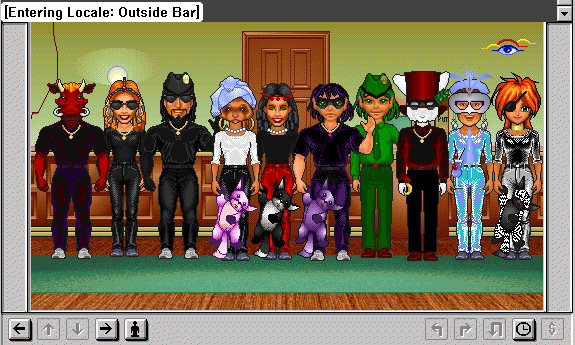
Do you recall what your name was in Hotel Silicon?
I don't remember who I was in-world in Hotel Silicon. I didn't spend a ton of time in there, because I was managing engineering (which involved coordinating with Sheryl's team and QA, plus dealing with the Japanese team).
Do you remember who built the original Hallway world?
I don't remember who built Hallway or Hotel Silicon. There were a few people involved, mostly in Sheryl's group. David Peterson worked for her and was one of a tiny team who wrote the code that managed in-world objects. I suspect Reid was involved, since he was the product manager. I ended up being involved because after it started up, it just got ignored.
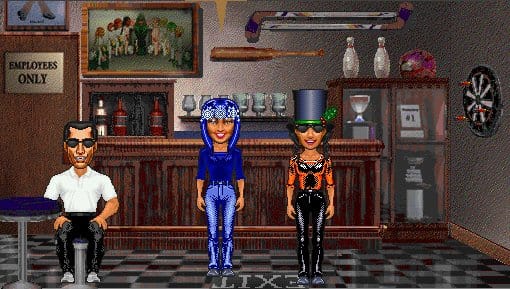
Do you remember a world called Affinity? I remember in Hotel Silicon there was a Bar named The Final Score and some of the imageURLs in there say something like Affinity bar. I was wondering if Affinity was an early name for Hallway.
I remember the name Affinity, but that's about it. I know we had one paying customer that had a world, which I think was for gay men. I don't remember what the world was called.
Author notes: - That world was called Pride.
Did you have plans for Hallway/Hotel that you never got to action due to you leaving?
Maybe, but I don't remember.
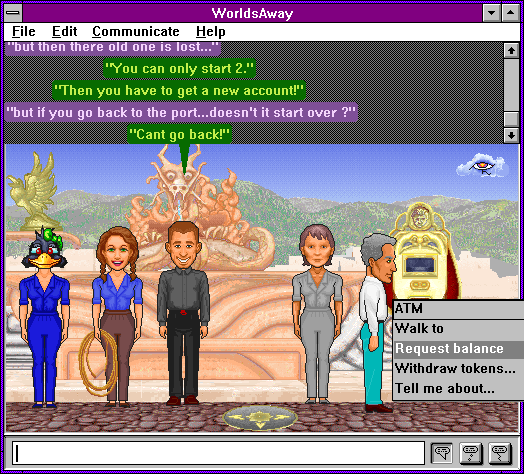
Did you ever go back and visit WorldsAway at all after you left?
The physical building or the Dreamscape? No to both. I worked farther up the peninsula for getting together during the day for lunch (plus I saw my friends at SCA events or aikido).
How do you feel about your time working on WorldsAway overall? Did you learn anything there that you carry with you to this day?
That was probably the best job I ever had. We were doing something new, in a space I liked (I was a gamer), with a lot of my personal friends plus new friends I made there. I learned how to manage people and large projects, and did a good job at it. I've been a product manager since 2007 (or held jobs very similar) because of that, and I love it. The Dreamscape was cool, and beautiful, and I hope I get a chance to visit it again.
Author notes: - In preparation for getting this interview ready for publishing, I asked Karen if she had any more memories she'd like to share from her time at Fujitsu. The following memory came from that conversation.
Disneyland
I should probably mention that after the release of WorldsAway to the internet our management said we could do something special as a reward/celebration, and I was given a budget amount. I talked about it with the team, and someone suggested we should go to Disneyland. Ha ha, yeah, but wouldn’t that be fun.
Somehow (and I think some of the actors who helped this happen were the admins who worked for our larger group, because they were tickled by the idea) we were suddenly actually going. We all flew down together on Southwest, got on a bus to from the airport to the park, and were let loose for the day. We met for dinner at Goofy’s Restaurant, got back on the bus then the plane, and came home.
It was a Wednesday in the fall, with a little bit of rain falling, so there were hardly any other people in the park. We got to go on the new Indiana Jones ride without a line, get off and immediately get on it again twice (so we got to see all three versions of it), and it was like that the entire day